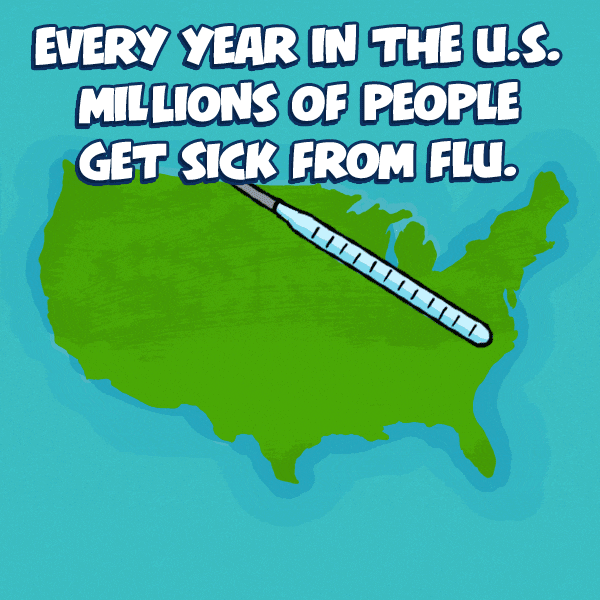Fall in Ohio brings football, crisp weather and pumpkins dotting front porches. Unfortunately, fall also brings the beginning of flu season.
The Centers for Disease Control and Prevention (CDC) this year is continuing its recommendation that all people six months of age and older receive a flu shot. The vaccine is especially important for those who are considered at high risk of flu-related complications, including people age 65 and older.
Getting the shot by the end of October before the flu typically becomes widespread is encouraged, because it takes about two weeks for immunity to set in after receiving the shot. However, even if you miss October, it is still important to get vaccinated, as it is still beneficial.
Why is the flu potentially so dangerous for older adults?
As people age, their immune systems become weaker, which places them at high risk for serious, flu-related complications. During most flu seasons, people age 65 and older bear the greatest burden of severe flu disease. It’s estimated that 70-85% of seasonal flu-related deaths in the United States have occurred among this age group. This same group also accounts for between 50% and 70% of seasonal flu-related hospitalizations.
How does the flu shot protect older adults?
According to the CDC, vaccination is the first and most important step in protecting against the flu. Studies have shown that flu vaccination can prevent flu illness and flu hospitalization. Also, vaccination can make the illness milder if someone does get sick.
Are there special flu shots for those 65 and older?
While those who are 65 and older can get any flu shot that is approved for use in that age group, there are also two vaccine options designed specifically for them, to promote a stronger immune response.
- High-dose flu vaccine: Called Fluzone® High-Dose, it contains four times the amount of antigen as a regular flu shot. The additional antigen creates a stronger immune response (more antibody) in the person getting vaccinated.
- Adjuvanted vaccine: Called FLUAD™, this is a standard dose flu vaccine with an added adjuvant. An adjuvant is an ingredient added to a vaccine to help create a stronger immune response in vaccination.
Can the flu shot itself give you the flu?
While people may experience some mild side effects – like soreness, tenderness, redness/swelling where the flu shot was given, and maybe a headache, muscle aches, fever, nausea and tiredness – flu shots are safe and do not cause the flu. The high dose and adjuvanted flu vaccines may result in more of these mild side effects. And, all side effects are mild compared to the flu itself.
What if I get the flu?
There are prescription drugs that can treat flu virus infections, and the CDC recommends that people 65 and older be treated with influenza antiviral drugs if they get the flu. If you have flu symptoms – even if you already had a flu shot – call your health care provider as soon as possible. The medications work better the sooner they are started. If you have any of these symptoms, you might have the flu and should call your health care provider and describe the symptoms:
- Fever or feeling feverish/chills
- Cough
- Sore throat
- Runny or stuffy nose
- Muscle or body aches
- Headache
- Fatigue (tiredness)
- Sometimes diarrhea and vomiting
Where can I get a flu shot?
There are many places to get a flu shot. Your doctor’s office, local pharmacy, or health department are all good places to start. Get a list of local health departments in our Resource Directory.
How much does the flu vaccine cost?
Medicare Part B covers the cost of one flu shot per flu season. More information: https://www.medicare.gov/coverage/flu-shots.
Are there other ways to help prevent the flu?
While getting a flu vaccine each year is the single best way to prevent seasonal flu, good health habits like covering your cough and washing your hands often can help stop the spread of germs and prevent respiratory illnesses like the flu. And, anyone who lives with or cares for a person age 65 and older should get the flu shot as well, to avoid passing along the infection.
Where can I get more information about the flu and the flu vaccine?
- Ohio Department of Health Flu Website
- Centers for Disease Control and Prevention Flu Website
- American Lung Association Flu Information
- Medicare & You Flu Prevention Video
Sources: Centers for Disease Control and Prevention, Medicare.gov

